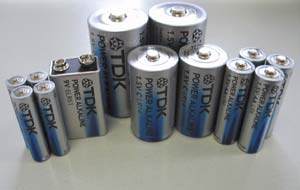Waste batteries pose a threat to health and the environment
According to an environmental study in Canada, consumers only reuse about 2% of used batteries and tons of toxins from these batteries that are present every year at landfills.
According to the study, Canadians will throw nearly 500 million batteries in 2010, while in 2004 they threw about 347 million batteries. Discharged batteries contain heavy metals that can flow into places that bury garbage and contaminate areas that store clean water.
 (Artwork: 4giftsdirect) From now until 2010, battery waste will contain 747 tons of lead per year known to affect a child's intelligence, half a ton of mercury can damage the human nervous system, 287 tons of nickel and 3,501 tons of manganese, all containing toxicity.
(Artwork: 4giftsdirect) From now until 2010, battery waste will contain 747 tons of lead per year known to affect a child's intelligence, half a ton of mercury can damage the human nervous system, 287 tons of nickel and 3,501 tons of manganese, all containing toxicity.
The report raises questions about the effectiveness of volunteer programs to encourage good work for the environment. Environmentalists recommend that a law be made for manufacturers to be accountable, forced to recall and recycle products. Manitoba State once suggested this program. Some provinces have studied measures related to electronic waste, including waste batteries.
Environment Minister John Baird said he was concerned about the issue. He said 'The results of the study will help the Canadian Ministry of Environment encourage the industry to improve battery recovery and recycling'.
VN
- Electronic garbage - a threat to people
- The waste of visitors pollutes the 'Roof of the world'
- Hungarian incidents and bauxite lessons with Vietnam
- Big C Supermarket: Collect used batteries
- Penguins of Antarctic poison with feces
- Turn your old laptop battery into an electric charger
- Produces extremely high performance batteries from the things we still throw away every day
- Clean medical waste by Japanese technology
- The risk of meteorites and cosmic waste threatens the Earth
- Dangerous climate change like HIV / AIDS
- New solution for waste in Vietnam
- Use rice husks to produce electric batteries
 Is the magnetic North Pole shift dangerous to humanity?
Is the magnetic North Pole shift dangerous to humanity? Washington legalizes the recycling of human bodies into fertilizer
Washington legalizes the recycling of human bodies into fertilizer Lightning stone - the mysterious guest
Lightning stone - the mysterious guest Stunned by the mysterious sunset, strange appearance
Stunned by the mysterious sunset, strange appearance